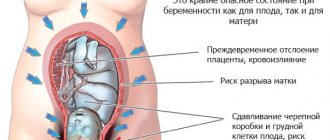Colic is a natural phenomenon that occurs in all children from infancy. Symptoms of colic can appear in the first weeks of a baby’s life and can prevent parents from sleeping for a couple of months. But you shouldn’t worry about colic as a disease, because this phenomenon occurs in every child, regardless of the baby’s health. What are the causes of colic, how to recognize them and help your baby?
Causes of colic
There are many reasons for the formation of colic in a baby’s intestines, but there are also primary sources - the main causes of the disease. Most often, colic appears due to:
Features of the digestive system
All organs of the baby’s gastrointestinal tract begin to become familiar with food and new working conditions. The circulatory system begins to adapt to living conditions, and muscle tissue to heaviness and new load. Despite the fact that nature has provided the most optimal nutrition for the baby - breast milk, the child’s stomach and intestines also have to get used to it. Contractions of all internal organs, movements of the baby, the balance of digestive enzymes and even breathing patterns - all this affects digestion. Immaturity of the gastrointestinal tract is the root cause of colic, causing discomfort in the intestines, spasms and severe pain for the baby due to increased gas formation. Further, problems with defecation and severe belching may appear. These symptoms are completely normal, but babies are especially sensitive to them. When the digestive system fully adapts to food and the digestion process, colic will no longer bother the baby.
Attaching to the breast
Very often, colic also occurs from improper attachment of the baby to the mother's breast. Because of this, the baby may latch onto the breast incorrectly and inhale a large amount of air through his mouth during feeding. This can cause bloating and intestinal colic.
Mother's nutrition If the child is breastfed, you should take care of your nutrition. There are special diets for nursing mothers, and they will definitely come in handy if the baby often suffers from colic.
Baby's diet It is worth ruling out the possibility of a violation of the diet in order to find out the cause of colic. This point is a bone of contention among many pediatricians, because some believe that feeding must be according to a schedule, while others are of the opinion that feeding should only be done at the request of the baby. Only the child’s mother can determine the correct option. You can adhere to a specific strict regimen and feed every three hours, monitoring the baby’s condition, or change the strict system to feeding on demand. If there is no change in condition, the cause is excluded.
Formula for feeding If the baby is bottle-fed, the cause of colic may be the formula. You need to change the mixture to a different brand and composition or carefully follow the rules for preparing the mixture.
Characteristic features of the baby Often, colic manifests itself as a reaction to the baby's emotions - crying, anxiety and severe restlessness. Strong crying, intensive swallowing of air and excessive nervousness can cause frequent occurrence of colic in a newborn.
"I'm wet"
Crying about diaper discomfort usually sounds like prolonged whining. At the same time, the child does not scream or react to toys, he just whines all the time. Mom is angry: she recently fed, should she really breastfeed again? First, check the diaper, maybe that’s the reason. If we guessed right, then after hygiene procedures and an air bath the child should become noticeably calmer.
Important: if the child screams very loudly, and the reason turns out to be in the diaper, after washing, carefully dry the child’s skin in the perineal area and carefully examine the condition of the skin. Most often, a loud cry from a wet diaper indicates the presence of diaper rash.
Symptoms of colic in infants
How to identify colic in an infant and not confuse the symptoms with more serious illnesses? It is worth focusing on the following signs:
- severe bloating, rumbling;
- the child calms down only after the gases have passed;
- severe crying;
- colic appears from the tenth day of life and can bother the child until the fourth month;
- the baby curls his fingers and toes;
- the stool remains familiar and unchanged;
- the baby presses his legs to his stomach;
- the face turns red when crying;
- Colic occurs most often in children who quickly gain weight.
These simple symptoms will help parents distinguish colic from diseases of the digestive system and choose the right treatment for colic. The best option would be to consult a specialist who will recommend effective methods and high-quality effective carminative drugs.
"I am hungry!"
It is quite difficult to confuse such a cry. This is exactly a cry, not a whining. The cry is furious and demanding, which will not subside until the baby's desire is satisfied. A mother can take the baby in her arms, rock, cradle and sing songs, but this will only make him scream louder, because he is completely misunderstood. In this case, the child may try to put his fist in his mouth and turn towards his mother’s breast. What the right way out of the situation would be is probably not worth explaining.
How to help a child with colic?
Many parents worry about how to take care of their baby during colic and alleviate his condition. There are some simple but very effective techniques that effectively relieve pain when colic occurs and speed up the release of gas. Simple tips on massaging the abdominal wall and correct positioning of the baby will help you quickly cope with colic:
- Stroking the tummy, gently moving clockwise.
- Place a warm palm on the baby's stomach and lightly rock the baby in your other hand.
- Attach the baby to the breast when colic appears, rocking slightly. This will help relieve colic, relax the baby and calm him down.
- Place a warm diaper on the tummy, pre-heated on a radiator or ironed.
- Do simple but effective gymnastics-massage of the abdominal wall, pressing your knees towards the baby’s tummy. It is effective to press your right knee towards your left elbow and vice versa. This will help relax the muscles and provoke the rapid release of gases.
- Do the Airplane exercise. The baby should be placed on his tummy and slowly rocked in different directions. This should be done very smoothly and carefully. This exercise will not only help calm the baby and relieve colic, but also greatly amuse the child when he begins to be capricious.
- Tiger pose on a branch will help relieve colic and calm the baby. A great massage position for dads with strong arms. It is worth bending your arm at the elbow and laying the child down - belly down. The baby's head should be in the palm of your hand. By gently shaking your hand, you can calm your baby and overcome colic.
- A warm bath with herbal decoctions will help to effectively remove colic and alleviate the condition of the baby. This method is especially relevant if the child loves to swim. You need to organize a bath with a warm decoction of chamomile or chamomile, which will perfectly calm you down and set you up for a healthy sleep.
- A gas tube is the last option and is only suitable for severe and painful colic. This method is the most effective, but the baby quickly gets used to the device and will no longer be able to do without it. In addition, such a device can harm the anal mucosa. If parents nevertheless decide to resort to this method, it is worth lubricating the tip of the device with baby cream or Vaseline and inserting it two centimeters, but no more. This method may cause deficiencies.
Reviews #MAMAKO
kanstansiya
Why do mothers choose adapted MAMAKO® Premium formulas? The story of how Savely overcame colic. Mothers whose babies are completely on IV are faced with some problems when choosing a formula. For Savely, choosing a mixture, as it turned out, was not an easy task. We tried many companies, but in the end we came to one - Adapted milk formula from @mamako.ru Premium with natural goat milk, its creamy taste conveys all the love of nature. We, like many, encountered bloating, gas and colic, and only a mixture with goat milk miraculously helped us forget about this terrible word - “colic”. As a mother, it is very important to me that the baby receives the most necessary vitamins for the development and growth of the child.
shitova_sasha
It so happened that I need to heal a little. Perhaps someday I will talk about this and urge everyone to take care of themselves, but that’s not what I’m talking about right now. Although our IV is temporary, I approached the issue of choosing a mixture thoroughly. Now we eat the @mamako.ru mixture, which is produced on the basis of goat milk in Spain. Why did I choose a mixture with goat milk? Firstly, it has a different composition of proteins than cow milk. Therefore, if a child is intolerant to cow's milk, then a goat's milk formula may be suitable for him (exactly our case). BUT! If you have allergies, you should always consult your pediatrician! Secondly, precisely due to the properties of goat’s milk, soft, curdled flakes are formed in the baby’s stomach, which are easier to digest.
Colic medications
For severe and very painful colic, special medications are also applicable, but only after the appointment of a specialist. It is the doctor who will competently select the optimal drug for the baby. The following list of effective drugs is recognized as the most effective drugs:
- Capsules or suspension Espumisan L Refers to effective carminative drugs. There are three types in the Espumisan line, but you should pay attention only to the medicine for newborns. Espumisan can be given to a child from the first day of life. The product will effectively relieve colic and help remove gases. The product has a pleasant banana taste, so giving it to your baby is not a problem at all. The first dose is 25 drops and can be mixed with breast milk or given alone.
- Suspension Sab Simplex The drug removes and destroys gas globules and carefully removes them from the baby’s body during intestinal peristalsis. The product will perfectly eliminate colic and is absolutely safe for the baby.
- Bobotik drops The advantage is that the drug is not absorbed into the gastrointestinal tract and comes out unchanged, while perfectly relieving the baby of colic. The drug does not contain sugars and is suitable for addition to formula or breast milk. One bottle contains 50 doses of medicine, so the product will last for a long time.
- Plantex powder The product is designed to combat colic and is extremely popular among parents. The drug is made from fennel fruit and works on the principle of dill water. The drug perfectly accelerates the release of gases and improves gastrointestinal motility. The advantage is that it regulates the digestive system and increases the baby’s appetite.
- Infacol suspension Facilitates the release of gases from the intestines, relieves spasms and reduces the baby’s pain. The drug does not have a systemic effect and is excreted unchanged from the child’s body. Can be taken from the first weeks of life. The course of the drug is determined by a specialist.
- Bebinos Drops Has a pronounced antispasmodic and carminative effect, helps with flatulence, colic and pain. Developed on the basis of plant extracts, in particular fennel and chamomile. The drug has an anti-inflammatory effect and relieves pain, carefully normalizing the functioning of the gastrointestinal tract. The product improves digestion and peristalsis.
- Bifiform baby suspension Eliminates intestinal colic and fights pathogenic organisms. It is a means of heavy artillery. The suspension perfectly kills microbes, but at the same time preserves bacteria beneficial to the microflora. The product reduces the risk of acute diarrhea in the baby.
- Linex capsules Restores the child's intestinal microflora, eliminates pathogenic microorganisms. The drug helps restore normal bowel function and ensures optimal action of intestinal enzymes. The drug takes care of the intestinal microflora and the normal balance of lactic acid bacteria in the gastrointestinal tract.
- Baby Calm Emulsion The product is based on vegetable oils, in particular anise, dill and fennel oil. The product acts on the principle of dill water and perfectly eliminates colic in the baby. This effective remedy for babies helps eliminate flatulence and normalize microflora. The advantage of the drug is its mild antispasmodic effect. This emulsion has a pronounced anti-inflammatory effect and antibacterial effect. Provides carminative effect.
Parents should remember that only a doctor can prescribe the appropriate drug and treatment regimen for the baby. It is worth excluding not only intolerance to certain drugs, but also allergies to components. Also, the doctor will be able to determine the optimal dose of the drug for a particular baby in accordance with the weight and age of the child.
Regurgitation
What is expressed in
During or after eating, semi-digested milk pours out of the baby's mouth.
If the milk has not had time to go down the esophagus, then it is no different from normal. If it reaches the stomach, then a coagulation process occurs and it will emit a sour smell.
Intensity and Volume
From 1 to 4 months, regurgitation after every meal is considered normal. Volume - from 1 to 2 tablespoons and once more than 3 tablespoons. The intensity of regurgitation increases from about 20 to 30 days, when mother's milk becomes more mature. By 6 months, the baby usually stops burping.
Why does a child spit up often?
The muscular valve at the top of the stomach still does not hold its contents well. Part of the milk that does not have time to enter the stomach is poured out. Any movement contributes to the “splashing out” of the food eaten back.
How to help if your baby is spitting up:
- Make sure your baby doesn't overeat;
- Feed your baby more slowly;
- Try changing the baby's position during feeding - perhaps the baby swallows air along with the milk;
- After each feeding, be sure to place the baby in a “column” position so that he can burp without choking;
- If he doesn’t burp for a long time, put him in the crib on his side and make sure that the baby doesn’t roll over;
- Avoid shaking, squeezing, or turning your baby after feeding;
- If you formula feed your baby out of necessity, try a new type of bottle or nipple with a smaller opening to reduce air intake.
When should you worry?
When your newborn spits up too often, count how many times he pees per day. If the total is about 12 times or more, the amount of milk is normal, but the baby spits up too much.
If your child frequently spits up, has trouble gaining weight, or has problems with urination, it is advisable to consult a doctor.
How to prevent colic
There are many methods to prevent colic or its frequent occurrence. Some practical tips will help you effectively and efficiently minimize the occurrence of colic. In particular:
- you need to put the baby on his tummy before feeding;
- The baby should lie on a hard surface, for example, a hard mattress. This will relieve tension in the abdominal muscles and prevent the occurrence of colic;
- After feeding, it is recommended to hold the baby in an upright position and wait for the appearance of a burp. This method will help to painlessly remove gases from the baby’s body;
- Dill water is one of the ancient methods of ridding a child of gas. This water should be given after each feeding of the baby. It’s very simple to prepare – you just need to steep half a spoonful of seeds in a glass of boiling water. It is worth giving your child only slightly warm dill water.
"The weather is changing"
The vascular system of babies is still very delicate and sensitive, so they can be called “meteorologically dependent”. Sudden changes in weather, pressure changes, and magnetic storms can negatively affect the emotional state of the baby.
It has been proven that a magnetic storm, for example, can provoke stress and whims of a child on the day of the storm and several days after. If the sun was shining for a long time and it was warm, and then it suddenly rained and got colder, then you shouldn’t be surprised that the child is capricious and demands to be held all the time. On such days, there is nothing left to do but relax, delegate all household chores and enjoy endless hugs with the baby. If your baby requires motion sickness, you can use a fitball to ease the load on your back and arms.
Diet for mom
A proper mother's diet will help prevent possible gas formation and flatulence in the child. Many products are absolutely safe for the body of both mother and baby, but there are also aggressive ones that often cause unwanted colic.
A mother who feeds her baby milk for up to four months should completely exclude the following foods from her diet:
- Cabbage of any kind;
- Coffee and tea;
- Tomatoes;
- Dishes with hot and fiery seasonings;
- Onion;
- Nuts;
- Products with caffeine;
- Tomatoes;
- Cow's milk;
- Corn
- Sour cheese;
- Legumes.
If the child's colic is caused by any of these foods, then after a two-day diet they should completely go away.
No matter how parents worry about colic, this is a completely normal occurrence for infants. You should take this calmly and help your child cope with the disease using simple and effective methods. In case of complications and extreme painfulness of the process, the best option would be to contact a pediatrician, who can competently prescribe an anti-colic medication exclusively for your baby - based on age and weight. Proper treatment will solve the problem and prevent the worsening of flatulence.
"I can't calm down"
A child has a hysterical and loud cry when he has received too many new or bright positive emotions.
Change of place, guests, new people, active games. All this caused delight and surprise in the child, he laughed a lot or simply actively perceived new information. And then it was all over, it was time for the baby to calm down and sleep, but he couldn’t.
He has overexcitation, that is, a state when the body already needs peace and rest, but the nervous system still cannot reach a state of balance. Hugging, rocking, breast or pacifier can help get out of this state.
When should you see a doctor?
If your baby continues to cry a lot and nothing helps, go to the doctor. He will either confirm that the baby does indeed have colic, or suggest what else may be causing the excessive crying. If your baby still has symptoms of colic after he or she is six months old, it is time to consult your pediatrician. Seek emergency medical help if:
- the child has a temperature of 38 or higher;
- the crying attack lasts longer than two hours;
- the child refuses to eat;
- the child has vomiting or diarrhea
- baby sleeps longer than usual.
Air in the stomach
What is expressed in
The baby tosses and turns, cries or screams loudly.
Causes
Air in the stomach, which the child swallows along with food, regardless of the feeding method.
What can you do
You need to help the baby release excess air:
- Hold him upright or place him face down on your lap, pat his back and wait for him to burp;
- During feeding, make sure that the baby grasps with his mouth not only the nipple itself, but also the areola. If he feeds from a bottle, hold it so that the neck is always full.
Vomit
What is expressed in
The contents of the stomach “splash out like a fountain”, with more force than during regurgitation.
Causes
There are many reasons. This may be normal, or it may indicate pathology. Vomiting is not dangerous if it occurs rarely and is not accompanied by any other alarming symptoms.
- Overeating - in this case, you just need to calm the baby down, caress him, and carry him in your arms. Don't rush to feed him again.
- Maternal hygiene - you should wash your breasts before and after feeding and monitor your own proper nutrition. Fatty, salty and spicy foods can also cause vomiting and digestive disorders.
- Poisoning - vomiting can be a reaction to poor quality food. This is usually accompanied by loose stools. In this case, be sure to call a doctor. Make sure that your body does not lose a lot of fluid. Every 15 minutes, offer your baby a teaspoon of clean boiled water. When the vomiting stops, give a tablespoon. In case of diarrhea, you can give your baby an activated carbon tablet dissolved in water and wait for the doctor to arrive.
- Intestinal infection - usually begins with a sudden attack of vomiting, often with fever or diarrhea. It is necessary to replenish fluid loss as soon as possible and consult a doctor immediately, as this disease can be life-threatening. The doctor will prescribe therapy for you.
- Concussion - if vomiting begins after the baby falls from any height, call an ambulance.
When to worry:
- If the child does not want to breastfeed or take formula;
- If the baby is lethargic;
- If he has a fever;
- If the baby vomits more than 3 times a day;
- If vomiting is accompanied by diarrhea;
- If the child has lost a lot of fluid.
Not a single, even the most modern, artificial formula can become a complete replacement for breast milk.










